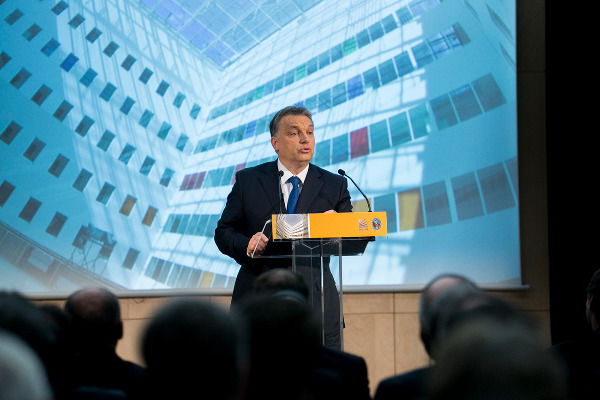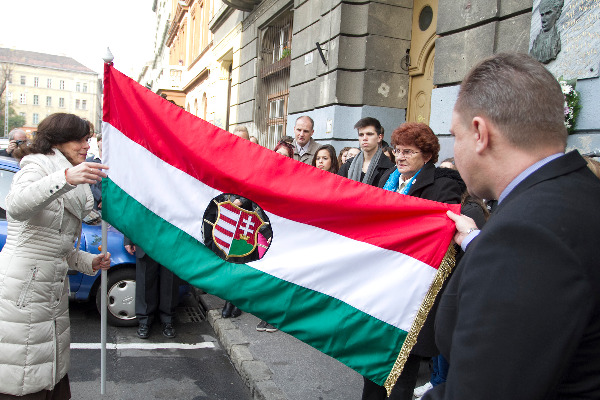Consistent Foreign Relations - Fidesz Presents its Foreign Policy Strategy
|
Mr János Martonyi, former Minister of Foreign Affairs of the centre-right Orbán-cabinet between 1998 and 2002, Mr Tibor Navracsics, head of the parliamentary group of Fidesz, Mr Zsolt Semjén, chairman of the Christian Democratic People's Party (KDNP) and Mr Zsolt Németh, chairman of the National Assembly's Committee on Foreign Affairs were present at the conference unveiling the foreign and security strategy of the main opposition party. |

Mr János Martonyi, former Minister of Foreign Affairs of the centre-right Orbán-cabinet between 1998 and 2002, Mr Tibor Navracsics, head of the parliamentary group of Fidesz, Mr Zsolt Semjén, chairman of the Christian Democratic People's Party (KDNP) and Mr Zsolt Németh, chairman of the National Assembly's Committee on Foreign Affairs were present at the conference unveiling the foreign and security strategy of the main opposition party. The document entitled "Consistent Foreign Relations" is the first in a series of policy papers based on the party's manifesto, "A Stronger Hungary", adopted in December 2007.
Mr Tibor Navracsics, head of the parliamentary group of Fidesz opened the conference, giving a brief outline of the domestic crisis in Hungary, emphasizing that the cabinet had no clear perspective, lacked talented ministers and lost all its credibility. "Hungary has a government which cannot lead the country", said Mr Navracsics, pointing out that in such circumstances, it was the opposition's duty to come up with a viable strategy. The strategic document entitled "Our Future" was thus adopted by the party's congress in May 2007, followed by a policy-debate, drawing on several foreign models through consultations with German, British and Polish conservative parties. The manifesto, A Stronger Hungary was unveiled at a conference in December 2007, adopted by the National Board of Fidesz on 30 March, 2008.
"The only way to create a successful manifesto is by producing detailed policy papers to underpin it", said Mr Navracsics, pointing out that the strategy entitled Consistent Foreign Relations was the first in a series of such documents.
"Fidesz is capable of governing the country, it could guarantee the stability and competitiveness required to render Hungary a reliable member of the international system again", concluded the head of the parliamentary group of the main opposition force.
Mr Zsolt Semjén, chairman and head of the parliamentary group of the Christian Democratic People's Party (KDNP) said the party's core values and priorities were all included in the policy paper. "The commitment to the Judeo-Christian values of Europe, as well as the emphasis on the national interest are among the main foreign policy issues of the party", said Mr Semjén, who declared that this common tradition could form Europe's identity. Referring to Hungary's goals, he said that a five-party consensus was needed to provide citizenship for ethnic Hungarians living in Voivodina.
Mr János Martonyi, former Minister of Foreign Affairs said Fidesz was convinced that Europe could only be strong once its citizens accepted their traditions and origins and decided to leave the postmodern state of skepticism. Mr Martonyi highlighted two major policies which needed immediate action, CAP and the common energy policy of the European Union. Speaking of the latter, he declared that "this is not only a matter of ecology or economy, but of security policy as well". The former Minister of Foreign Affairs stated that apart from the common European gas market, a regionally based one was also necessary.
Chairman of the Hungarian National Assembly's Committee on Foreign Affairs, Mr Zsolt Németh said that the current cabinet's foreign policy was inconsistent and erratic, rendering the country unreliable in the eyes of its partners. The legitimacy of the incumbent socialist government was in question since 2006, said Mr Németh, adding that the cabinet was mostly improvising in diplomatic affairs.
"This policy paper sets a vision for the period between 2008 and 2014", declared Mr Németh, pointing out that the document could serve as a basis for a consensus between the Hungarian political parties. "We are ready to consult in any relevant question, and upon finalizing the strategy, we will hand it in to the National Assembly", he said.
Mr Németh said that fundamental aim of Hungary's foreign policy should be to serve the country's national interests by focusing on the protection of human rights which, speaking of the ethnic Hungarians in the neighboring states, meant supporting their strive for autonomy.
(www.fidesz.hu)
 több
több


 több
több
 Az MTA Természettudományi Kutatóközpont új épületének átadása
Az MTA Természettudományi Kutatóközpont új épületének átadása
 Megemlékezés Gérecz Attilára
Megemlékezés Gérecz Attilára
 több
több
 több
több




























